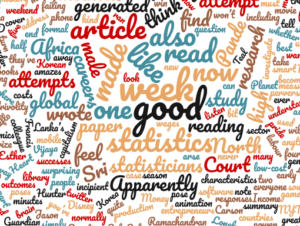Hi all,
My attempts to focus on anything this week have been severely undermined by the start of the NBA season (and Sri Lanka’s inability to win any ODIs, but we’ll gloss over that). Between the gruesomely broken ankles and Joel Embiid’s attempt to vaporize Jason Smith, we were also treated to Patrick Beverly putting Lonzo Ball’s soul in his back pocket and snacking on it like a candy bar. It’s been glorious (which is good, because Sri Lanka are now 129/7). Anyway, the week hasn’t all been fun and games, and I’m not only talking about my attempts to reacquaint my brain with the algebra it last met in 2003.
- The NYT ran a brilliant article about Amy Cuddy this week. She was one of the authors of the ‘power poses’ study, which purported to show that simply holding a pose for a few minutes could generate measurable physiological changes, and in turn have a significant impact on real-world outcomes. It was the basis of a wildly popular TED talk, but also generated a massive backlash: the experiment failed to replicate and statisticians savaged the paper for violating principles of good statistics (one of the co-authors eventually disowned the study due to these practices). The article is really worth reading, dipping into the culture of academia and how careers are made and lost. I’d also read this response by Andrew Gelman, one of the aforementioned statisticians. I think it’s disingenuous to paint this as victimisation – if the methods were so flawed that you can’t trust the result, this needs to be made clear. In a context where academics are under ever greater pressure to communicate directly with the public this is crucial: good methods and null results do not get Guardian headlines.
- Apparently, numbers are a bit of a problem for the Supreme Court in the US, too. John Roberts referred to statistical research presented as part of a case as ‘gobbledygook’, and this isn’t an isolated incident: FiveThirtyEight documents the long and troubled history of statistics in the Supreme Court. It amazes me how many otherwise smart people take some kind of perverse pride in failing to understand statistics.
- Vijaya Ramachandran and co. have a new (DFID-funded) paper out on labour costs in Sub-Saharan Africa, and whether it can become a low-cost manufacturing destination. It generated quite a few responses on Twitter, and they’ve made an attempt to address them, here. Francis Teal is the other researcher to listen to on this question, which won’t go away: why are formal sector wages so high in Africa?
- What does ‘capitalism with North Korean characteristics’ look like? Planet Money investigate the incipient entrepreneurs of North Korea and their surprising successes (transcript) – including the production of mobile phone software for the global market and animation that was ultimately used in a Disney movie.
- Income inequality 101 from Branko Milanovic. As good a summary of what different measures of global inequality tell us as you will find anywhere.
- Questions four and five in this interview with Rohini Pande cover her experience as a woman in economics and her research into gender in developing countries, well-worth reading. Apparently, early in their careers, Esther Duflo and Pande were subjected to a male economist asking their male colleague to ‘correct their mistakes’. He must feel like an arse and a half now.
- I normally end these on a note of high frivolity, but this week, the best thing I read was this article about Carson McCullers (who wrote two of my favourite books) by Patricia Lockwood. If you’ve never read her, go to the library now and find The Heart is a Lonely Hunter. And if you want to feel inadequate think about this: she wrote it when she was 22.
Have a great weekend, everyone!
R

